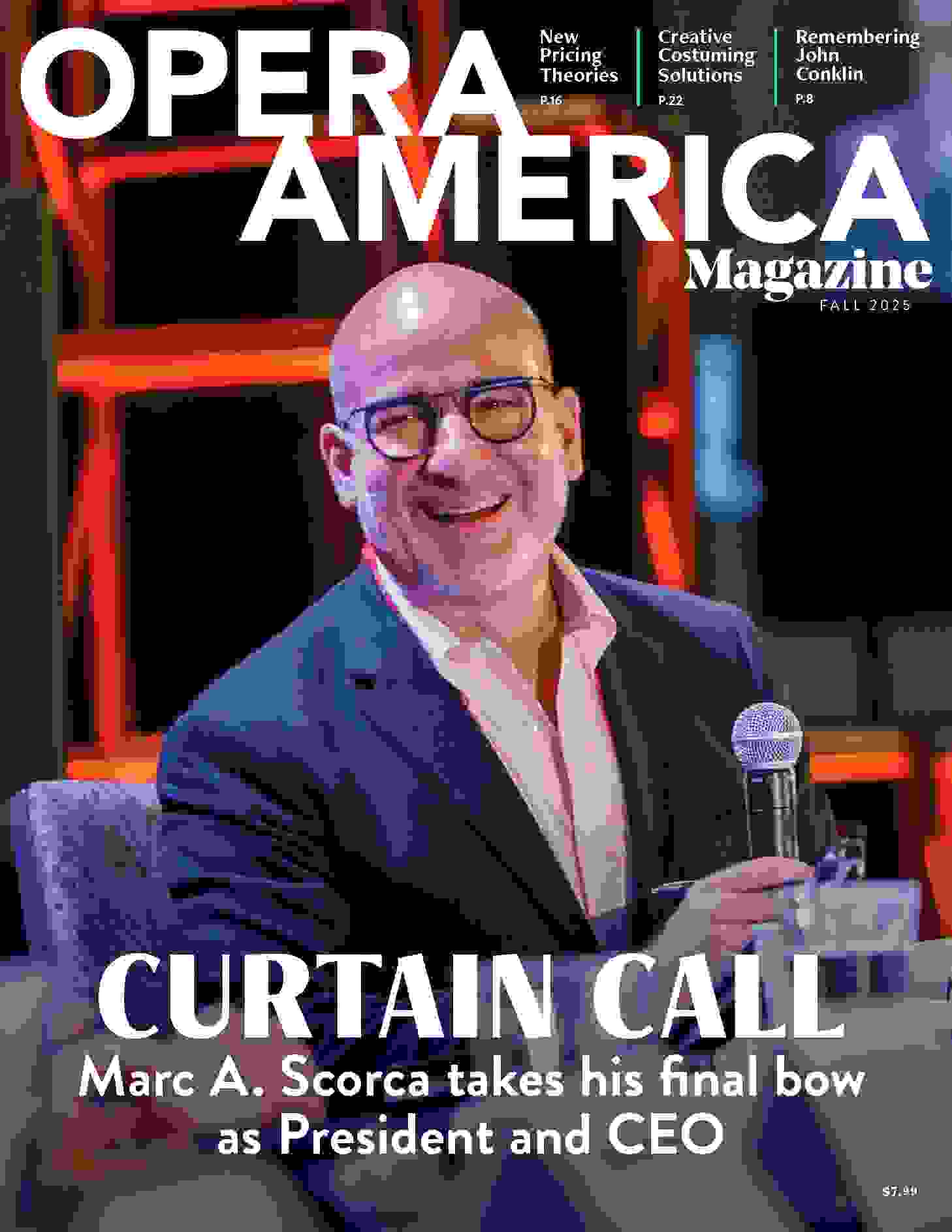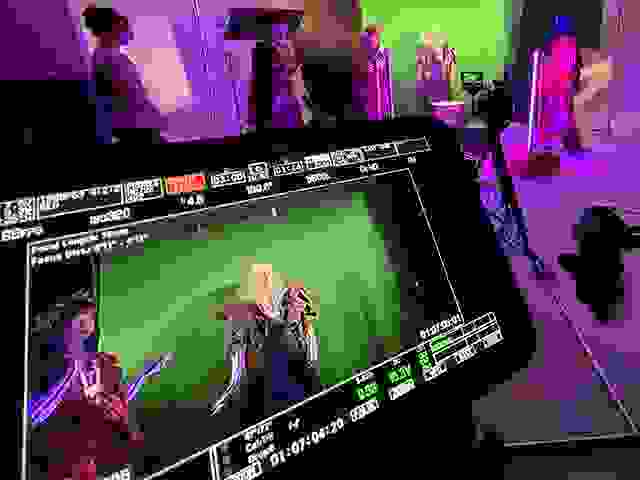Les contes d'Hoffmann
Composer: Jacques Offenbach
Librettist: Jules Barbier, Michel Carré
Company: Metropolitan Opera
| Performance Dates | |
|---|---|
| Tuesday, September 24, 2024 | |
| Saturday, September 28, 2024 | Matinee |
| Tuesday, October 01, 2024 | |
| Saturday, October 05, 2024 | Matinee |
| Thursday, October 10, 2024 | |
| Sunday, October 13, 2024 | Matinee |
| Friday, October 18, 2024 | |
Synopsis
For many years, Hoffmann has been obsessed by his stormy relationship with an opera singer, La Stella. In his own mind, when he tells his tales, he separates the facets of her character into three distinct personalities: Olympia, the doll-symbol of woman as "object"; Antonia, the young singer starved for success but deprived by illness; and Giulietta, the courtesan who uses her beauty to seduce the unwary. La Stella, the star of Hoffmann's life, the "perfect" woman, has the three faces of Eve; each time their love dies, he sees her dying too, and each time love is rekindled, he sees her in another guise.
While he fragments Stella's personality, he gives common characteristics to the various men whom he sees as his opponents; he embodies all of them in the lawyer, Lindorf, whose only real fault lies in the fact that he is another of Stella's admirers.
This fragmentation and combination of the personalities of others (he treats all the servant figures similarly) result in a division within Hoffmann's own persona which for some time has made him unable to write or reason clearly. He lives only through his fantasies, and the efforts of his conscience, his muse, to redeem him for his art only precipitate further disaster. Finally, however, Hoffmann rejects Stella; in so doing, he exorcises his fantasies, regains his soul, and is at last able to fulfill his destiny as a writer.
Prologue
Luther's tavern, the Opera Cellar
Stella is singing Donna Anna in Don Giovanni. Hoffmann has left the performance early and is drinking heavily in Luther's Opera Cellar beneath the opera house. He believes that Stella has come to reclaim him. His better nature, his muse, is trying to rescue him from despair, and sees his rejection of Stella's performance as a step in the right direction.
Lindorf bribes Stella's servant, Andrés, to hand over her letter to Hoffmann with the key to her dressing room.
Hoffmann's friends persuade him to sing them the legend of Kleinzach, a misshapen creature who loves beauty in vain. Hoffmann becomes lost in his own reveries about Stella, and the students accuse him of being in love himself. An altercation with Lindorf leads Hoffmann to accuse the lawyer of being the source of his misfortunes. He then tells the assembled company the story of his "three loves."
Act I
Spalanzani's house
Spalanzani has "created" his daughter, Olympia, and Hoffmann is infatuated with her. His better nature tries to make him see her for what she is — a mindless, empty puppet of a girl — but when Coppélius, a strange purveyor of optical illusions, sells Hoffmann a special pair of spectacles which enhance his vision of his beloved, he becomes completely enslaved by her beauty. Spalanzani is not at all pleased to see Coppélius, who claims a share in Olympia's paternity, and packs him off with a bankdraft in settlement of his debt.
Olympia makes her debut in Society and sings at Spalanzani's reception; Hoffmann persuades himself that she returns his love. Coppélius discovers that the bankdraft has been drawn on a bankrupt moneylender and returns to revenge himself on Spalanzani by attacking his daughter. Hoffmann's spectacles are broken in the ensuing struggle and he finally realizes the hideous truth about his beloved Olympia.
Act II
Crespel's house
Years later, Hoffmann finds his next love, Antonia, in the house of her father, Crespel, who hopes to hide her from the world and from Hoffmann, whom he regards as an unfortunate influence. The young singer has fallen victim to the same consumption that afflicted her mother, a famous singer. In an attempt to shield his daughter from that fate, Crespel makes her promise never to sing again.
The misunderstandings of Franz, Crespel's deaf servant, allow first Hoffmann into the house, where he renews his relationship with Antonia, and then Doctor Miracle, the quack Crespel blames for the death of his wife. Hoffmann, in hiding, is horrified when Miracle treats the absent girl and forces her to sing. Hoffmann persuades Antonia, much against her will, to sacrifice her singing career to his love, and leaves her, promising to return. In his imagination he sees Miracle deriding Antonia's hopes for a happy marriage and inciting her to obey her mother's dying wish that she follow in her footsteps. These memories, and her own hunger for applause, spur Antonia on to excess, and when Hoffmann returns she collapses in his arms. Miracle reappears to pronounce her dead.
Act III
Giulietta's palace
Giulietta, a courtesan, lives under the protection of Captain Dapertutto, who relies on her to seduce wealthy young men who yield her first their pockets and then, in extremis, their souls. Peter Schlémihl, an officer, has lost everything — his shadow, his soul — to her; Piticchinaccio, Giulietta's lover, taunts him. Hoffmann, now at the lowest point of his life, is dangerously involved himself. He ignores the warning voice of reason, who accuses him of being in love once again, and pledges his soul to the devil if it should ever be true, which Dapertutto proceeds to arrange. Giulietta offers Hoffmann her love in exchange for his soul, his reflection; Hoffmann believes her and is lost. Schlémihl discovers them in flagrante and challenges Hoffmann to a duel. Schlémihl is killed and Hoffmann has to defend himself against Dapertutto's murderous intentions.
Epilogue
Luther's tavern, the Opera Cellar
Don Giovanni is over, Hoffmann's tales are told, and he is deep in drink and misery. When the students leave to escort Stella from the stage door, she comes to Hoffmann, followed by Lindorf, who has taken advantage of the stolen key. Stella attempts to rekindle Hoffmann's old passion for her, but he angrily rejects her and she leaves with Lindorf. In rejecting his past, Hoffmann has regained his soul. He is at last able to hear the call of his muse: “To know the pain of love, the passion of despair, is to learn the truth of life…let the poet live again!”
Courtesy of Boston Lyric Opera and authors Renaud Doucet and André Barbe




